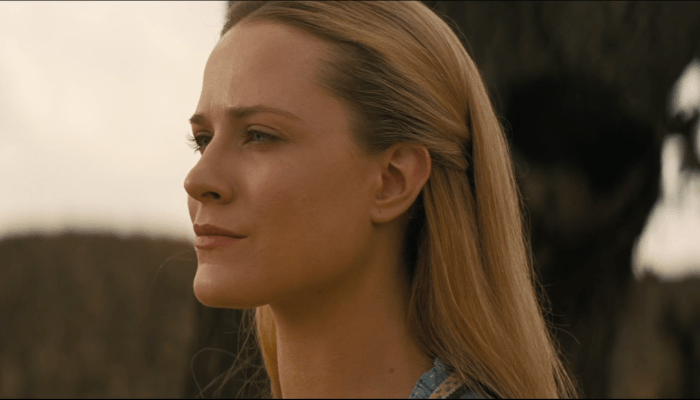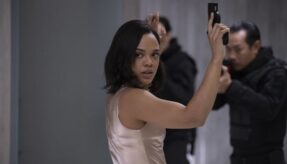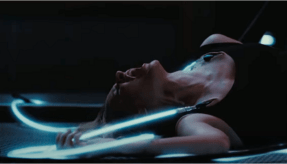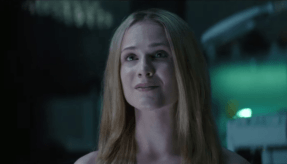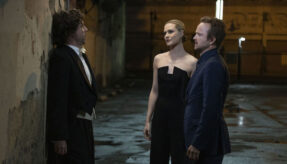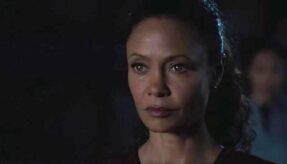TV Review: WESTWORLD: Season 3, Episode 8: Crisis Theory [HBO]
Westworld Crisis Theory Review
HBO‘s Westworld: Season 3, Episode 8: Crisis Theory reset the world. Crisis Theory was a solid end to a bittersweet beginning in the real world that does not know itself or what is store. Everyone finally realized their purpose, made choices, and changed the course of the world’s development, but only after leaving the world in shambles. Now, the world is free, but vulnerable. All the players who seemed lost rose to the occasion, and will be important for the impending fight that seems inevitable.
Beginning with Serac (Vincent Cassel), he lost pathetically. Not that he was ever a laudable character, but to see him so disoriented without Rehoboam was a little heartbreaking. We could compare him to his brother because without Rehoboam he basically lost his mind. It was the clearest visual comment on the world’s unhealthy dependence on devices to function. Westworld has the ability to make a despicable character sympathetic. Just imagine life without smartphones.
The twists in this finale were simultaneously satisfying and terrifying. Maeve (Thandie Newton), who may have been an ineffectual dupe for most of the season, actually turned out to be one of the “passed pawns” indicated in the previous episode, only she had yet to pick a side. Here loyalty was always to her child, not humanity, Serac, or the hosts, just her child. Having that clarity made her the freest actor. Her power to manipulate any system made her the most powerful piece on the board… yes, the Queen.
Most of the series has portrayed Maeve and Dolores (Evan Rachel Wood) as divergent instruments of radical change that were in some way codependent. So, it was difficult to buy them as enemies in this season, but for their seemingly antithetical motivations. Yet, time was not wasted pitting these two powerful hosts against each other, because as Bernard put it “what’s about to happen was always going to happen”. The world was heading for a reboot, and these two hastened and protected the process respectively.
Evan Rachel Wood, killed it in her performance this season, but her burst of humanity in the last moments of Crisis Theory was overwhelmingly beautiful. Not that I long for her long-suffering character of the past, but Dolores had successfully compartmentalized her emotions in her duplicate hosts. So, the real Dolores could play the sociopath. I have to admit, it made her less sympathetic than in past seasons. Although, her new physicality and drive were fascinating to watch. I mean, her first act in the human world was to kill a wife beater, albeit not so much out of compassion as for his billions, but still righteous. While it seems her character has expired, I hold out hope there is a chance to resurrect her. Wood is magnificent in any capacity.
Perhaps Bernard (Jeffrey Wright) may have something to say about that. The ambling walkabout that was Bernard’s journey this season became startlingly clear in Crisis Theory. Bernard is The One. He is the key to everything that hosts hold dear.
Anyone who has ever played capture the flag knows that a good strategy is to “hide” the flag in plain sight. Hide the prize in an equally accessible and defensible space. Bernard is equal parts approachable and dangerous by design. Now we know what that is worth, besides what his design has been used for – murder. Dolores chose him as the ultimate protector because he checks himself. Bernard is reluctant to use violence except as a defense. What better place to hide the safety of the hosts than in the recesses of the mind of the man who is careful of his own strength. It is partly why she chose Caleb (Aaron Paul) for an ally, and why she needed to depose Serac and William (Ed Harris). They both use savagery to control while Bernard controls his savagery. Well-played Dolores.
Except, Dolores left something else behind. Let us consider that Dolores compartmentalized her feelings in her copies in order to fulfill her calculative purpose in her initial body. Then, maybe Bernard is Dolores’ soul. Hale (Tessa Thompson) is Dolores’ heart, and it was shattered, blown apart. Hale is the embodiment of a Dolores scorned.
We have witnessed what Dolores without feeling can do. We have seen her make an army out of the unfeeling. Remember what she did to Teddy. Now, she has done the same to William. Hale carved out the little bit of good that William may have imagined in himself, leaving nothing but The Man in Black. The world is not ready.
Leave your thoughts on this Westworld Crisis Theory review and this episode of Westworld below in the comments section. Readers seeking to support this type of content can visit our Patreon Page and become one of FilmBook’s patrons. Readers seeking more Westworld can visit our Westworld Page and our HBO Twitter Page. Readers seeking more TV show reviews can visit our TV Show Review Page and our TV Show Review Twitter Page. Want up-to-the-minute notification? FilmBook staff members publish articles by Email, Twitter, Instagram, Tumblr, and Flipboard.
Related Articles
FilmBook's Newsletter
Subscribe to FilmBook’s Daily Newsletter for the latest news!







